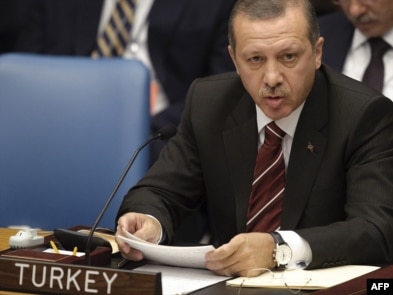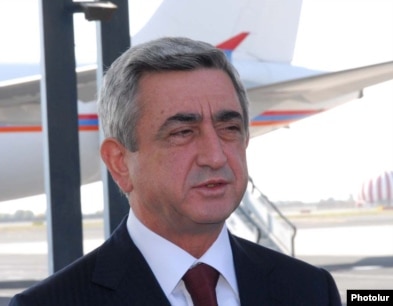by TOL
12 October 2009
With Turkey and Armenia now talking to each other, outside powers hold the key to resolution of the Caucasus’ most intractable conflict.
This week saw an important step toward an easing of the tensions surrounding the breakaway province of Nagorno-Karabakh, with an agreement to restore diplomatic ties and open the border between Armenia and Turkey for the first time since 1993. The presence of the French, Russian, and U.S. foreign ministers at the signing ceremony on 10 October signaled their countries’ commitment to the accord. Assuming that the countries’ parliaments ratify the deal, the border itself will be opened within two months.
The deal nearly fell apart at the last minute when the Turkish and Armenian foreign ministers could not agree on the statements they would each make at the ceremony. In the end, both agreed to make no speeches.
Each side had to make a substantial concession to realize this small step. The Armenian side had to swallow the fact that Ankara was not going to apologize for, or even acknowledge the existence of, the mass slaughter or, as the Armenians insist, genocide of more than 1 million Armenians in 1915. Instead, Turkey promised merely to open a dialogue with Armenia over the issue, including the creation of a joint historical commission. For their part, the Turks had to agree to lift their border blockade even though Armenia’s ally-cum-offshoot, the de facto Republic of Nagorno-Karabakh, illegally occupies 17 percent of the territory of Turkey’s ally, Azerbaijan. Armenian skeptics argue that the creation of the commission will mean the indefinite postponement of genocide recognition by Turkey. Turkish critics urged their government to insist that Armenia give up its territorial claims on Turkey as a precondition for opening the border.
Opposition politicians and nationalists on both sides accuse their governments of selling out their national legacy for short-term economic gain and have vigorously protested the accord, whose confirmation by the parliaments is by no means a sure thing. Opening the Turkish border and allowing some trade with Armenia will be one small step in the direction of a lessening of tension. Opinions differ over who stands to benefit more from an open border – Armenia, because it would help revive its anemic economy, or Turkey, because it would boost Ankara’s influence in the region. Clearly, large-scale trade would take off only if Azerbaijan also opened its border with Armenia. Goods from Turkey that take 10 days to arrive in Azerbaijan via Georgia could cross Armenia in four hours.
Remnants of a war lost: Wrecked Azerbaijani tanks in Nagorno-Karabakh. Creative Commons licensed photo.
HISTORICAL PRECEDENTS
The dispute over Nagorno-Karabakh is the toughest to solve of all the conflicts that erupted in the post-Soviet space – in Georgia, Moldova, and Tajikistan. It was the only one to involve the occupation of the territory of an internationally recognized sovereign state (Azerbaijan); and the only one to involve direct conflict between two states (until the 2008 war, Russia’s support for Georgian secessionists had been indirect). Also, the Karabakh conflict was unique in coming against the background of a century of hostility between Armenians and Turks, with many on both sides viewing the Azeris as a branch of the Turkish people.
Sixteen years after the end of fighting in Karabakh, the dispute seems as far from resolution as ever. Two bodies cannot occupy the same space: the Karabakh Armenians are not willing to accept Azerbaijani rule, and Azerbaijan is not willing to give up any of its territory. (And that is not even getting into questions of war crimes, refugees, and so forth.) Time does not heal all wounds. It causes some sores to fester and infect the rest of the international body politic. In Armenia and Azerbaijan new generations have grown up who did not personally experience the casual multiculturalism and close friendships across ethnic lines that were the norm in the Soviet period. Rather, they have been raised on a pedagogic diet of national victimization and imminent threat.
Why, after 16 years of inertia, are the two sides ready to make even this modest movement forward? The answer is external pressure. Last year’s Georgia war was a wake-up call to the international community. “Frozen” conflicts can thaw in a flash, and “local” conflicts can quickly draw in global powers, guns blazing. You don’t need to be Tom Clancy to imagine a scenario where the August 2008 conflict turned into a shooting war between Russia and the United States. In the case of Armenia, the resumption of war with Azerbaijan could conceivably draw in Turkey and Russia.
Russia has the biggest leverage over Armenia, and Turkey probably has the closest connections to Azerbaijan – although neither country is in a position to dictate terms to its ally. Turkey is acting as a responsible regional power, even though the carrot of eventual entry to the European Union is looking more remote with each passing year.
The Armenians’ anger over Turkish reluctance to acknowledge and apologize for the 1915 genocide is one of a series of cases where historical truth is an obstacle to current political and economic relations. 2010 will mark the 100th anniversary of Japan’s occupation of Korea – but Korean hopes that the Japanese emperor will visit Seoul and apologize for the colonization are unlikely to be realized. Greece continues to insist that the Republic of Macedonia’s name constitutes a territorial claim on the Greek province of the same name, and on that basis has blocked Macedonia’s entry to NATO.
Resolution of the Nagorno-Karabakh dispute itself, or even something as ephemeral as a “road map” toward its resolution, is still nowhere in sight. Azerbaijan is unwilling to accept the consequences of its defeat in the 1992-1994 war, and has been using its burgeoning oil revenue to rebuild its armed forces. Many hardliners on both sides seem to believe that it will take another war before the two antagonists are really prepared to make the compromises necessary for a lasting peace (just as the 1973 war seemed to clear the way for peace between Israel and Egypt). Apart from the human costs of war, the chances of escalation and the involvement of other powers make such a scenario unacceptably risky. That is why, for once, Russia and the United States seem to be following the same script. Their continued cooperation in the pursuit of peace is the best chance for avoiding more wars in the Caucasus.




 President of Azerbaijan Ilham Aliyev has been pronounced the Person of the Year at a forum of Turkish-speaking diasporas in Toronto which also saw participation of representatives of Georgian, Latvian, Lithuanian and Estonian communities.
President of Azerbaijan Ilham Aliyev has been pronounced the Person of the Year at a forum of Turkish-speaking diasporas in Toronto which also saw participation of representatives of Georgian, Latvian, Lithuanian and Estonian communities.



 U.S. — Turkish Prime Minister Tayyip Erdogan attends the United Nations Security Council meeting during the UN General Assembly at UN Headquarters in New York, 24Sep2009
U.S. — Turkish Prime Minister Tayyip Erdogan attends the United Nations Security Council meeting during the UN General Assembly at UN Headquarters in New York, 24Sep2009


 Armenia — President Serzh Sarkisian speaks to journalists.
Armenia — President Serzh Sarkisian speaks to journalists.